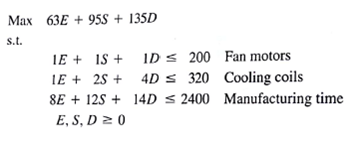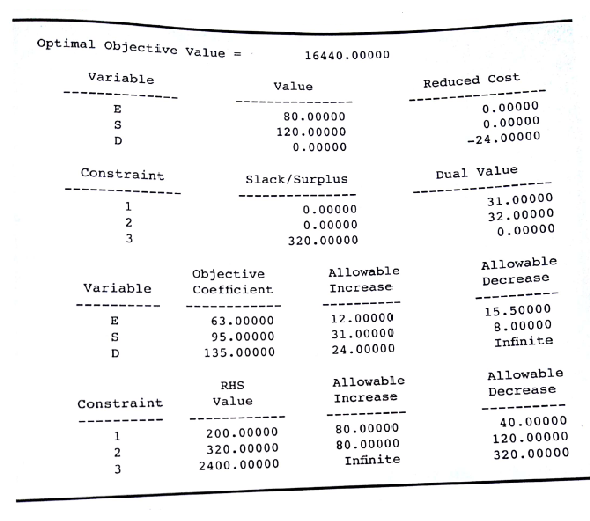
An Introduction to Management Science 13th Edition by David Anderson,Dennis Sweeney ,Thomas Williams ,Jeffrey Camm, Kipp Martin
Edition 13ISBN: 978-1439043271
An Introduction to Management Science 13th Edition by David Anderson,Dennis Sweeney ,Thomas Williams ,Jeffrey Camm, Kipp Martin
Edition 13ISBN: 978-1439043271 Exercise 21
Quality Air Conditioning manufactures three home air conditioners: an economy model, a standard model, and a deluxe model. The profits per unit are $63, $95, and $135, respectively. The production requirements per unit are as follows: 
For the coming production period, the company has 200 fan motors, 320 cooling coils, and 2400 hours of manufacturing time available. How many economy models ( E ), standard models ( S ), and deluxe models ( D ) should the company produce in order to maximize profit? The linear programming model for the problem is as follows:
The computer solution is shown in Figure 3.17.
a. What is the optimal solution, and what is the value of the objective function?
b. Which constraints are binding?
c. Which constraint shows extra capacity? How much?
d. If the profit for the deluxe model were increased to $150 per unit would the optimal solution change? Use the information in Figure 3.17 to answer this question
FIGURE 3.17 THE SOLUTION FOR THE QUALITY AIR CONDITIONING PROBLEM

For the coming production period, the company has 200 fan motors, 320 cooling coils, and 2400 hours of manufacturing time available. How many economy models ( E ), standard models ( S ), and deluxe models ( D ) should the company produce in order to maximize profit? The linear programming model for the problem is as follows:

The computer solution is shown in Figure 3.17.
a. What is the optimal solution, and what is the value of the objective function?
b. Which constraints are binding?
c. Which constraint shows extra capacity? How much?
d. If the profit for the deluxe model were increased to $150 per unit would the optimal solution change? Use the information in Figure 3.17 to answer this question
FIGURE 3.17 THE SOLUTION FOR THE QUALITY AIR CONDITIONING PROBLEM

Explanation
Linear Programming
Linear programming i...
An Introduction to Management Science 13th Edition by David Anderson,Dennis Sweeney ,Thomas Williams ,Jeffrey Camm, Kipp Martin
Why don’t you like this exercise?
Other Minimum 8 character and maximum 255 character
Character 255


